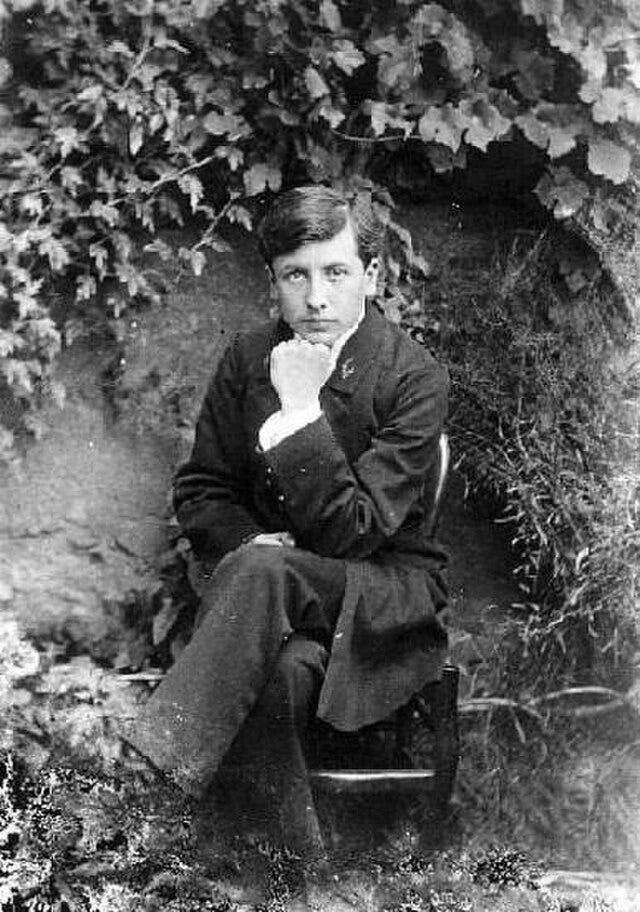[As I promised a day ago, I am republishing this essay from nearly ten years ago, and for a number of reasons. Two I have already mentioned: one is that my next column will touch upon a few of the themes it addresses; the other is that my next installment of Music for a While will be dedicated to modern British composers, to which topic it is also relevant. There is one more reason, which I have not yet named: the essay also contains a brief reminiscence of my father, and it just so happens that today—the 23rd of December—would have been his 98th birthday.
A blessed Christmas to all who keep the feast; and many blessings to all, of whatever observance.]
[2014:] This year, of course, we mark the centenary of the beginning of the end. It was in July of 1914 that European Civilization entered its final death throes, the last convulsions of which would not subside for more than thirty years. After that, not even the illusions remained. The great Western project of secular modernity that had begun with the wars of the emergent nation state back in the sixteenth and seventeenth centuries (conflicts that history, with her superb talent for hidden ironies, calls the “Wars of Religion”) had reached its logically ineluctable conclusion, carrying away the feeble remnants of Christendom on tides of human blood. Since then, the great moral mission of Western European society has been to arrange the debris in as attractive a style as possible, and to try to translate irreversible decline and disenchantment into some kind of humane ethos.
Even though, however, we cannot help but commemorate the start of the Great War this year, it is not an event we can really remember—and not only because practically no one is now alive who has any personal recollection of it. We owe some sort of reverent reflection to those who perished over the following four years (at least, I like to think we do), but the sheer scale of the cataclysm simply defies the scope of any rational imagination. There are those still among us, true, who have vivid memories of the utter brutality of the Second World War. My father, who passed away just this last year, lived through some of the most savage fighting in the European theater, during the push across France into Germany—in the Vosges Mountains, at Bitche, street to street in Heilbronn, and so on—and he experienced horrors that he never related to me or my brothers when we were growing up, but that left an indelible impress upon his mind. Yet even he, he told me more than once, found it impossible imaginatively to encompass the sheer barbarity and madness of the Great War.
For myself, in my private meditations, if I want to do some sort of justice to the memory of those whose lives were stolen away by the monstrous imbecility of the war that began in 1914, I have to think in epitomes. One can lament millions of deaths, but not really properly mourn them; it is possible, though, to fix one’s thoughts and, to some degree, one’s emotions on certain individuals. And lately, as I have been considering this approaching centennial, I have been thinking repeatedly about two figures, out of the very many who might have occurred to me: Henri Alban-Fournier (1886-1914), the French novelist who wrote under the name of Alain-Fournier, and George Butterworth (1885-1916), the English composer.
As their dates indicate, neither man lived long; and, consequently, neither left behind him a particularly weighty collection of completed works. Both produced art of extraordinarily wistful tenderness, in some ways unfinished or even immature, but perhaps for that very reason almost excruciatingly evocative; and everything they created bore unambiguous signs of genius. But there is not much of it. Alain-Fournier is remembered principally as the author of a single novel, Le Grand Meaulnes (1913), a small glittering masterpiece whose popularity has never waned in France, and a book that is among the most widely and frequently translated of the twentieth century. Butterworth’s entire published oeuvre consists in three short exquisitely lyrical orchestral pieces—Two English Idylls (1911), A Shropshire Lad (1911), and Banks of Green Willow (1913)—a song cycle of poems by W. E. Henley called Love Blows as the Wind Blows, which exists in three variants (1911-1914), and twenty-six other song-settings (many of poems by A. E. Housman); there also exists a suite for string quartet (1910), but it is never performed or recorded. One can read Alain-Fournier’s novel in an afternoon, and can listen to all of Butterworth’s music (including all three versions of the song cycle) in just under two hours. And yet it would be difficult to find two artists whose work more forcefully summons up a sense of what the Great War and its historical sequels destroyed forever.
Exactly why this is so is not easy to say. Le Grand Meaulnes, for example, is a book whose hold on the reader’s imagination seems so much greater than the sum of its parts. Every young person should read it around the age of nineteen, when the emotions it touches upon are still new. The plot hovers beautifully, if perhaps a little preposterously, between sentimental romance and fairytale; and at no point does it descend from its dreamy altitudes down to the hard earth of a France on the verge of a devastating war. At its center is the tale of a young man one night happening upon a mysterious château—where celebrations for a wedding that will not take place are being held, and where he falls hopelessly in love with a beautiful girl—but which he cannot find again the next day or for a long time thereafter. And, when at last he is reunited with his lost love, the complications of the plot that ensue are both tragic and almost hallucinatory in their remoteness from reality.
As for Butterworth’s music, its lyricism is so lush and earnest that only a young man could have written it. This is not to say that it is saccharine or gushing, like those interminable chromatic meanderings of Delius; it is rigorous in form, and no piece lasts a second longer than it should. But it is also an innocent music, perfectly timeless in its flowing beauty, betraying no hint of the darkness gathering on the horizon; and it is absolutely saturated by a feeling of gentle melancholy, of a longing for something fading away, or already lost.
For me, this is where the peculiar genius of both men lay: in their ability to evoke a sense of something always just at one’s back, which one cannot turn around quite quickly enough to glimpse—the sense of a lost country at whose border one can only drift, or of a lost memory whose trembling edge one cannot quite grasp. Theirs is an art pervaded by the ache of exile, the feeling of something now gone that was always both perilously fragile and deeply loved: a vanished childhood or early youth; departed innocence; the loveliness of rural France and England, with their woodlands and copses soon to be cleared away for development, and their fields and country lanes soon to be covered over by metaled motorways; an older social consensus, sustained by a rosier set of illusions; a fairyland fading in the light of dawn; a squandered and immemorial paradise; or whatever else. Above all, in long retrospect, it summons up images of a generation of children who grew up in the long, serene Edwardian spring, but who would not grow old enough to have children of their own.
Perhaps some of that is attributable to the accidents of personal history. Had either Alain-Fournier or Butterworth lived a full life, the symbolic power of his youthful works might not now seem so overwhelming. But the former was only 27 when he died in battle near Vaux-lès-Palameix (his body remained unidentified until 1991), and the latter only 31 when he was killed in a trench near the Somme (his body was never recovered); and it is difficult to encounter their art without the transience of their lives at least modulating how one reacts to it. But, really, that is not the only reason for the effect their works have. Both men, despite their youth, possessed a positive genius for nostalgia.
That is a significant gift. All memory is tragic in the end: the failures, humiliations, betrayals, sufferings, or calamities that we recall for the most part cannot now be undone; the joys, triumphs, discoveries, and raptures that we recall are for the most part long gone. All memory is haunted by the traces of a fall from grace or of an Eden to which we cannot return. So any artist who masters the medium of nostalgia has the power to render us all but defenseless. It is impossible to outgrow Alain-Fournier or Butterworth, no matter how sophisticated one’s sensibility might become, because the further one is removed from the naïveté of youth, the more deeply one is moved by recollections of the enchantments of innocence.
That is why both men serve as such painfully vibrant symbols of the world that was lost in the first half of the last century. For those of a mind to do so, I recommend marking the centenary of the Great War at some point in the coming year by reading Le Grand Meaulnes and listening to all of Butterworth’s surviving compositions. It would be very hard to think of two figures whose art and whose lives, taken together, so perfectly remind us of an innocence that perhaps our entire culture has now lost—and remind us also that some things, once lost, can never be recovered or restored.








Which translation of Le Grand Meaulnes would you recommend to a wretched monoglot like myself?
Despite both names being vaguely familiar, I know nothing of the work of either Butterworth or Alain-Fournier. I shall rectify that forthwith.